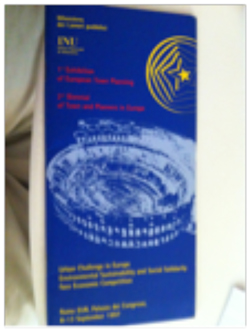Biennial II - Roma 1997
II Roma, Italy: 8 to 13 September 1997

Organized by the National Institute of Urbanism.
To create the initiative, a permanent international group was created. It was organized around eight discussion boards.
• The city's strategies in the face of global competition.
• Settlement systems between concentration and dispersion: processes, problems and policies.
• Networks of medium and small cities: between cooperation and competition.
• Policies for the preservation of the historical indentity of cities and territories.
• The profession of cabinetmaker: training, practice, instruments.
• Policies for the sustainable city.
• Policies to govern the effects of global competition on urban society; "intelligent" Europe.
• Magazines of planning and dissemination of the discipline.
• Government of cities and urban policies in the European Union.
The Biennial of Towns and Towns Planners: Institution and Process
Article written by Udo Dittfurth and Jörg Forßmann
The Biennial of Towns and Town planners can no longer be seen as an experiment, but as a vital institution.
In 1995, planners met for the first time at a European Biennial in Lyon, initiated and organised by the French Fédération Nationale des Agences d'Urbanisme (FNAU), to encourage a professional exchange amongst European planners.
Using the impetus gained from the success of the first biennial in Lyon, the Italian Istituto Nazionale di Urbanistica (INU) hosted the second biennial in Rome, in 1997. It was here that a Permanent International Working Party (PIWP) was founded to secure the establishment and effectiveness of the biennial. The countries involved sent a delegate to guarantee a continuity of personnel commitment to the event; this ensures the continuous integration and development of the biennials within the wider context of an European dialogue.
An exhibition on town planning in Europe was the fundamental innovation of the second biennial. The range of subjects presented was as broad as the participation: about 100 communities, mainly from member states of the European Union, got involved with subject matters such as:
City strategies for facing global competition
Urban concentration and dispersion
Sustainable development
Heritage conservation
Fall-out from global competition on the urban society
This exhibition was an impressive presentation of local projects in many different forms, and supported the workshops discussion of the conference.
It was agreed that the broad range of topics presented in Rome would be more clearly defined during the following biennial, in order to focus on problems and solutions and to intensify the scope of debate in Europe. In this way, the biennial will not remain merely presentation but will develop into a place of international exchange aiding the creation of new policies.
The 3rd Biennial, organised by the Vereinigung für Stadt-, Regional- und Landesplanung (SRL), continued the work of its predecessors and learnt from their experiences. An important step for the further development of the event was the formalisation of the preparation process. The biennial integrated with other forums at an international level. The PIWP liaised with the European Council of Town Planners (ECTP) in order to establish a more formal relationship with professional third parties.